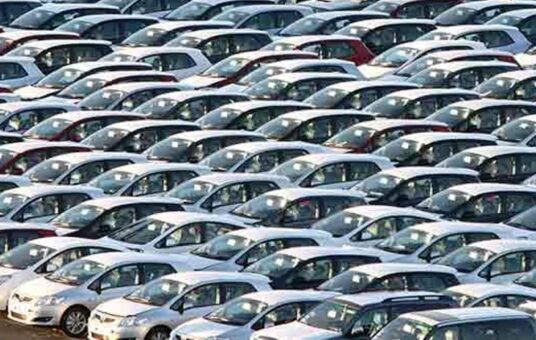ISLAMABAD: The import of Completely Built Unit (CBU) motor cars into Pakistan has surged by 21 per cent in fiscal year 2021/2022.
According to data released by Pakistan Bureau of Statistics (PBS) on Tuesday, the import of CBU motor cars increased to $310.41 million during fiscal year 2021/2022 as compared with $256.2 million in the preceding last fiscal year.
READ MORE: Prices of KIA Motors raised up to 19.3% amid rupee devaluation
In terms of rupee, the import of CBU motor cars posted a growth of 34.51 per cent to Rs54.67 billion during fiscal year 2021/2022 as compared with Rs40.65 billion in the preceding fiscal year.
The overall import of CBU vehicles registered an increase of 59.3 per cent to $616.39 million in the fiscal year under review as compared with $386.95 million in the preceding fiscal year.
The country imported CBU buses, trucks and other heavy vehicles worth $302 million and CBU motor cycles worth $4.12 million during the fiscal year 2021/2022.
READ MORE: Rolls-Royce, Hyundai signs pact to lead advanced air mobility market
On the other hand the import of Completely Knocked Down (CKD) motor cars recorded a massive growth of 52 per cent to $1.7 billion during fiscal year 2021/2022 as compared with $1.12 billion in the preceding fiscal year.
The overall import of CKD motor vehicles recorded an increase of 54 per cent to $2.44 billion in fiscal year 2021/2022 as compared with $1.58 billion in the preceding fiscal year.
Analysts believed that the import of CBU and CKD motor vehicles would fall in the current fiscal year due to high interest rates, regulatory measures and significant rise in prices of raw material in the international market.
READ MORE: Global car manufacturers agree to introduce electric mini-commercial vans
Analysts believed that amid continuous decline of the local currency against greenback, further price hike in car prices is imminent. “This would be the first time where we have seen the highest frequency (4x) of price increases by the auto industry in a fiscal year,” analysts at Insight Research said.
The main reasons are higher freight charges, abrupt movement in PKR/USD followed by launch of new model cars with lower localization which further add fuel to the price hike.
The localization policy started in 1987 and continued till 2004, which required compulsory localization for the automotive industry. However, automobile assemblers are still behind the required level of localization.
READ MORE: Pakistan car sales surge 54 per cent in FY22
The major players including Indus Motors, Honda Car and Pak Suzuki have been assembling vehicles since 1992, but localization level of these assemblers are still very low despite their long presence in the market.
In such situation, it will difficult for new players to achieve high localization as older players are still far behind the required level of localization. Moreover, local auto parts manufactures are sensitive to PKR/USD parity as they are reliant on imported raw materials for production. Thus, making the end product expose to PKR devaluation.
The analysts said that higher interest rate environment, currency devaluation and auto financing hindrances may pose threat to demand going forward especially in low segment cars under 1000cc.
